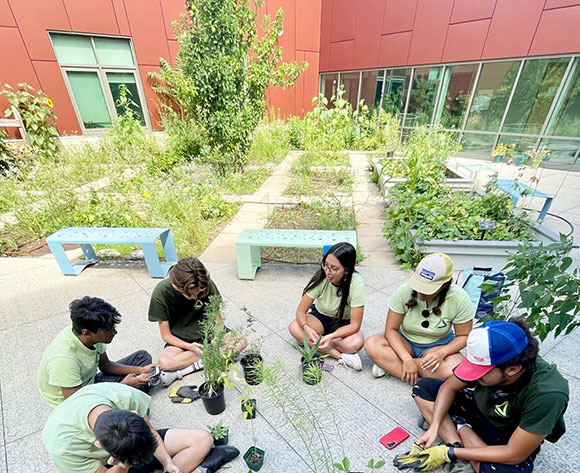
Members of the Groundwork Somerville Green Team program. ~ Photo courtesy of Kenzie Ballard
By Bridget Frawley
Groundwork Somerville is a nonprofit organization dedicated to facilitating environmental sustainability and food justice in the Somerville community. It approaches this goal through the avenues of youth education, community engagement and urban farming.
Urban Agriculture and Green Spaces Director Leah McCarthy joined Groundwork Somerville last April. Prior to working with the organization, she volunteered on an urban farm in Montreal where she ran an afterschool program to teach youth about climate justice. McCarthy educated through a culinary lens by preparing meals with the students and teaching them about the ingredients used.
“I love the nature of gardening and farming,” McCarthy said. “And I thought it was a powerful tool to feel connected and like we are a part of the Earth.”
McCarthy’s role revolves around the nonprofit’s two urban farm sites that make up South Street Farm. She uses the farm as an educational site to inform the community about the local food system and how it promotes a more sustainable future.
“I view my role as one of facilitating,” McCarthy said. “Making our foods comfortable, drawing people in and allowing them to experience the power of having your hands in the dirt and growing your own food.”
There was a fire at South Street Farm in November that burned camping gear, painting supplies and bikes that were used for the nonprofit’s youth programs.
“That was definitely unfortunate, but, in the end, it ended up bringing a lot of attention to the farm and to our mission,” McCarthy said. “It motivated our team to think more broadly about what we want this space to look like and what we can do to facilitate these changes that we’re hoping can happen in our community.”
Groundwork Somerville’s Green Team youth program employs 10 to 20 teenagers to work on urban and school gardens and are educated on topics of environmental and food justice. Youth Engagement and Programs Director Kenzie Ballard joined the organization in June, and has since expanded the Green Team to also be offered in the spring as opposed to only the summer.
Ballard also created a Green Team biking division program where five teenagers are taught about bike repair and fix donated bikes that are afterward redistributed to the community. The division is in partnership with Somerville Bike Kitchen, Somerville Education Foundation, and the Dojo at Somernova.
“Our youth are experiencing climate injustice and food injustice in their communities in their day to day living in food insecure households or areas in Somerville that are greater impacted by climate impacts,” Ballard said. “They’re feeling these negative impacts and they want to make a change and they have the power to make a change.”
The nonprofit also educates the community through events like the Harvest Festival that took place in August. Close to 200 attendees filled South Street Farm to participate in six workshops that used the farm’s produce for culinary demonstrations. Community members prepared salsa, roasted corn and fermented berries for jam while learning about food sustainability.
Promoting food justice is another goal of the organization that Climate Safe Neighborhoods and Community Engagement Director Sophie Cash has worked toward since her time at Vassar College for Environmental Studies
“I was raised with a White environmentalism, but also a deep sense of social justice. In college, I began to understand the deep connections between those two and how they (have) been separated on purpose in order to keep systemic oppression going,” Cash said. “They have to be addressed in tandem. When we do, that’s when we can get the most exciting solutions, the ones that center and benefit people.”
In her role, Cash researches neighborhoods with racially motivated land use practices and works to spread awareness on climate vulnerability in such areas including flooding, pollution and urban heat islands. As part of the Climate Safe Neighborhoods program, Cash is centering her research around East Somerville and utilizing data to create a story map that will tell the narrative of the area as a culturally and economically diverse neighborhood in the city.
“My lived experience is not necessarily exactly what people who live in East Somerville have experienced,” Cash said. “But I want to bring resources, organizing energy and capacity to help make sure that those voices are leading systemic change conversations.”
In the new year, Executive Director Aisha Sanders is focused on increasing the organization’s accessibility to the public through efforts like making part of South Street Farm a community garden. McCarthy is also curating an educational series of various workshops at the farm that include working with plants that reflects Somerville’s cultural diversity.
“We are passionate about engaging in the community and allowing community members, especially the most vulnerable, to self-advocate,” Sanders said. “We don’t feel like our role is to go in and be that voice. Our role is to gather the community together and support them and give them the tools and resources … to uplift the voices of the community members.”















Reader Comments